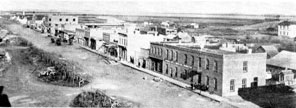|
ARTHUR
FRY WAS BORN MARCH 1, 1872 in Port Hope, Ontario, the youngest son of
Tom Fry and Lovedy Hancock. His parents had come from Warbston,
Cornwall England by sailboat - a trip of some five weeks.
Arthur Fry came from Ontario to Manitoba in 1892 to join his brothers
Thomas, George and Richard, who farmed in the Meglund district. 1895
found Arthur Fry working in the Hartney post office and selling men’s
overcoats from a room in the rear of the office.
During the next few years Mr. Fry was involved with many business
enterprises in Hartney – such as Fry Bros. Men’s Furnishings. This firm
came about with the arrival of Uncle Jim Fry and family from Carleton
Place, Ontario. Uncle Jim was an experienced tailor. Uncle Dick finally
purchased A.E.’s shares. There was the building of a livery barn which
was managed by William Butler with the barn later being bought by him.
A furniture business was purchased in partnership with Tom Hopkins.
This was sold in 1908 to H. Walton when Mr Fry acquired the Avondale
hotel. The name was changed to the Imperial. There were other
alterations made in the building – the part facing East Railway was
opened up with large plate glass windows into a pool room and barber
shop, and a grocery store and ice cream parlour were opened on the
Poplar Street side. Mr. Fry converted the grocery store to hardware in
1916 and operated this business until 1935.
A.E. Fry was an early member of the Masonic Lodge of Hartney. At one
time he had an office in the Grand Lodge of Manitoba. He was interested
in all sports. In winter it was curling, and many were the spoils
brought home from bonspiels. Mr. Fry was sometimes manager or secretary
of the baseball team and he also did some chauffeuring with his Model T
when visiting teams arrived from neighbouring towns.
Adapted from A Century of
Living, page 335.

The Avondale Hotel is visible in the right
foreground. Even in a small town like Hartney there were three hotels:
A Day in the Life of a
Small Town Hotel
“Running a small-town Manitoba hotel in the early 1900s was hard work.
The hotel staff usually consisted of at least two chambermaids and a
cook who worked from morning till night, cleaning the guest rooms,
doing the laundry, and washing dishes. The maid's work day usually
started at 6:00 a.m. and ended at 9:00 p.m. for which she was paid $10
per month, plus room and board. Porters not only assisted hotel guests
with their luggage; they also washed dishes, milked the cows that
supplied the milk for the hotel and did all the odd jobs. The upstairs
maid also polished the silver and glassware and kept everything
shining.
All members of the hotel owner’s family had to share in the work of
running the hotel. “One of the duties of the kids was to help with the
housekeeping and at noon you had to take your turn at washing the
dishes before going back to school. My sister, Irma, served as a
waitress in the dining room when she was barely taller than the table
tops.” “The years in the Hotel were busy ones for all of the family. It
was the boys’ job to fire the wood-burning furnace. This meant rising
about three a.m. and again at six to stoke the furnace. … We were
responsible for bringing in blocks of ice and snow to melt for the
daily wash. … We hauled our drinking water from the town well.”
Wash days – usually Mondays – were an ordeal, especially in winter.
Washing bedding and clothes was often a two-day proposition. Water had
to be hauled and then heated in tubs the night before. Start-up time
was set for five or six a.m. and the laundry process quite often ran
into the afternoon. The next day, one of the maids would run the
clothes and sheets through a mangle, a machine used to wring water out
of wet laundry. Most hotels did not get running water until the 1940s
or 1950s, so water had to be hauled from a well in the summer. In the
winter, hotels used melted ice and snow, or water that had been
collected in rain barrels during the previous summer.”
© Joan Champ, 2011
|





